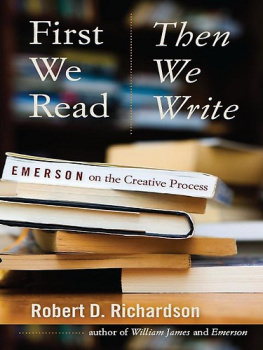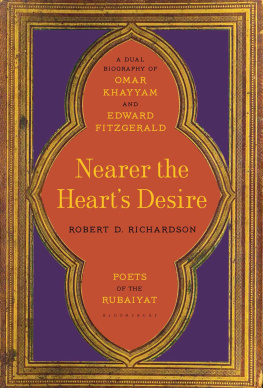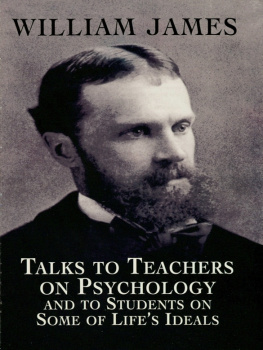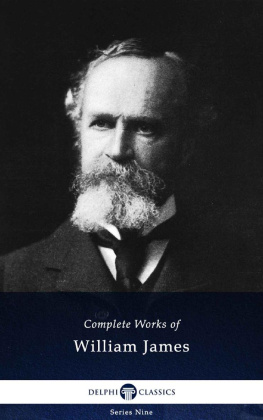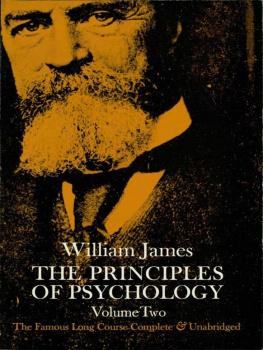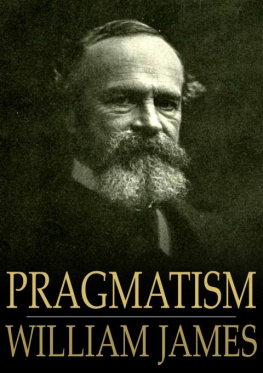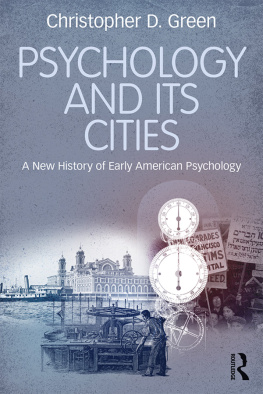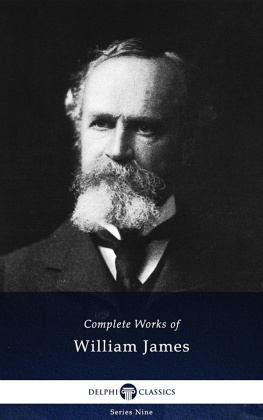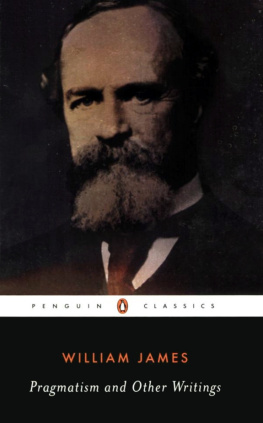First Mariner Books edition 2007
Copyright 2006 by Robert D. Richardson Jr.
ALL RIGHTS RESERVED
For information about permission to reproduce selections from this book, write to or to Permissions, Houghton Mifflin Harcourt Publishing Company, 3 Park Avenue, 19th Floor, New York, New York 10016.
hmhbooks.com
The Library of Congress has cataloged the print edition as follows:
Richardson, Robert D., 1934 .
William James / Robert D. Richardson.
p. cm.
Includes bibliographical references and index.
ISBN -13: 978-0-618-43325-4
ISBN -10: 0-618-43325-2
1. James, William, 18421910. 2. PhilosophersUnited StatesBiography. I. Title.
B 945. J 24 R 53 2006
91dc22 2005037776
ISBN -13: 978-0-618-91989-5 (pbk.)
ISBN -10: 0-618-91989-9 (pbk.)
e ISBN 978-0-547-52673-7
v2.0221
For A NNIE , who wrote,
We have less time than we knew
and that time buoyant, and cloven,
lucent, missile, and wild.
If this life be not a real fight, in which something is eternally gained for the universe by success, it is no better than a game of private theatricals from which one may withdraw at will. But it feels like a real fightas if there were something really wild in the universe which we, with all our idealities and faithfulnesses, are needed to redeem.
WILLIAM JAMES
Preface
T HIS IS AN intellectual biography of William James. That is to say, it seeks to understand his life through his work, not the other way around. It is primarily narrative, aiming more to present his life than to analyze or explain it. As with my previous books on Thoreau and Emerson, I have tried to read what James read and to show how his reading is reflected in his writing.
The James family is one of the most unusual of all American families, and it has become impossible to separate William James from his unorthodox and talented family, especially from his famous brother Henry, the novelist. My intention, however, has been to concentrate as much as possible on William himself, on the man who made major contributions to at least five fieldspsychology, philosophy, religious studies, teaching, and literatureand whose leading ideas are still so fresh and challenging that they are not yet fully assimilated by the modern world they helped to bring about.
William James believed not just that our minds are active rather than passive but that mind is activity. Nothing in our experience, for James, is really passivenot sleep, not hypnotic trance, not habit, not instinct, and least of all temperament. Active, it will be seen, does not mean orderly. Much of Jamess best work is a protest not only against dualism but against what Ian Hacking calls dynamic nominalism; that is, our habit of creating and naming categories into which we then sort ourselves. Once ADHD had been described, suddenly we saw it in every other child. Jamess strength of mind, his resistance to easy labeling, and his focus on experience itself rather than words for experience give his work its continuing explanatory power. James thought, for example, that our beliefs and attention are the same fact. He was supremely interested in how the mind actually works. For that reason he began with chemistry and physiologyespecially the latter, with its emphasis on the processes of the body. Where Freud insisted on the importance of the unconscious, James, who knew Freuds work before he met him, insists on the importance of consciousness, which he understood as a stream, a process. James indicates the road to modernism, and even to postmodernism, when he overcomes the ancient distinction between mind and body and proposes that the furthest we may be able to get is to say that the thought itself is the thinker.
James maintained that ones philosophy is fundamentally an expression of ones temperament. Jamess own quicksilver temperament is the key to his life, his thought, and his style. It was Nabokov who pointed out that the most interesting part of a writers biography is the biography of his style.
Alfred North Whitehead said, In western literature there are four great thinkers, whose services to civilized thought rest largely on their achievements in philosophical assemblage; though each of them made important contributions to the structure of philosophic system. These men are Plato, Aristotle, Leibniz, and William James. John McDermott says, William James is to classic American philosophy as Plato was to Greek and Roman philosophy, an originating and inspirational fountainhead. James is famous for pragmatism (which he sometimes felt he should have called humanism), though he should be remembered for his radical empiricism (which could have been called phenomenology); that is, his belief that reality is confined to what we experience, with the crucial proviso that nothing we experience can be excluded.
His book The Will to Believe was about the right to believe, and his Varieties of Religious Experience made religion possible for many educated moderns who are uncomfortable with the authority of churches and dogmas. The book is also a cornerstone of the modern field of comparative religion. Though it is nearly a hundred years since James died, his thought is still very much alive. I find him visibly and testably right, says Jacques Barzun. He is for me the most inclusive mind I can listen to, the most concrete and the least hampered by trifles.
Biography begins in the mysteries of temperament, lives in narrative, but aims beyond it, as the historian Jules Michelet understood, to resurrection. In telling the story of Jamess life I have tried to honor his love of spontaneity and activity and his positive fondness for chaos and chance. It was James himself who said, Individuality is founded in feeling; and the recesses of feeling, the darker, blinder strata of character, are the only places in the world in which we catch real fact in the making, and directly perceive how events happen, and how work is actually done.
I have been beyond fortunate in my teachers and friends. Jack Bate, the biographer of Keats and Johnson and my teacher in college and graduate school, first suggested that I write a life of William James. Jack liked to quote Whitehead about how education was impossible apart from the habitual vision of greatness. Jack was, and is, my vision of greatness. So is Justin Kaplan, the biographer of Twain and Whitman, who showed me the Cambridge Cemetery and stood beside me at the grave of William James. I am proud to say that John J. McDermott, who writes for those among us who believe in intellectual passion rather than settling for intellectual inquiry, considered me worth trying to educate. He also read the entire manuscript and helped at every turn. Annie Dillard believed in both my subject and me through thick and thin.
For substantial help and encouragement I am also grateful to Wendy Doniger, who helped with WJ and Sanskrit, to Gerald Holton, who called my attention to Ernst Machs and Niels Bohrs interest in WJ, to Stanley Hauerwas for his spirited critique of WJ, to Tracy Kidder for his interest in voluntary poverty, to Joan Mark for WJ and Mary Austin, to Brenda Wineapple for her work on WJ and Gertrude Stein, and to Carol Zaleski for calling my attention to Jamess interest in attention. I also owe more than I can acknowledge in a short space to the wide learning and good sense of the late Burton Feldman, of Victor Gourevitch, and of Jere Surber. The friendly kindness and enthusiasm of Deirdre Bair, Lyndall Gordon, Jerry Loving, James Maraniss, Jay Martin, Robert Stone, and Ann Warner helped keep me going. The students in my James family seminar at Chapel Hill provided important education. My colleagues in the Seekers Forum of Key Westtruly the Metaphysical Club Southgave me the openhearted but rigorous hearing we all hope for. A fellowship at the National Humanities Center in North Carolina got the book well and truly launched.


